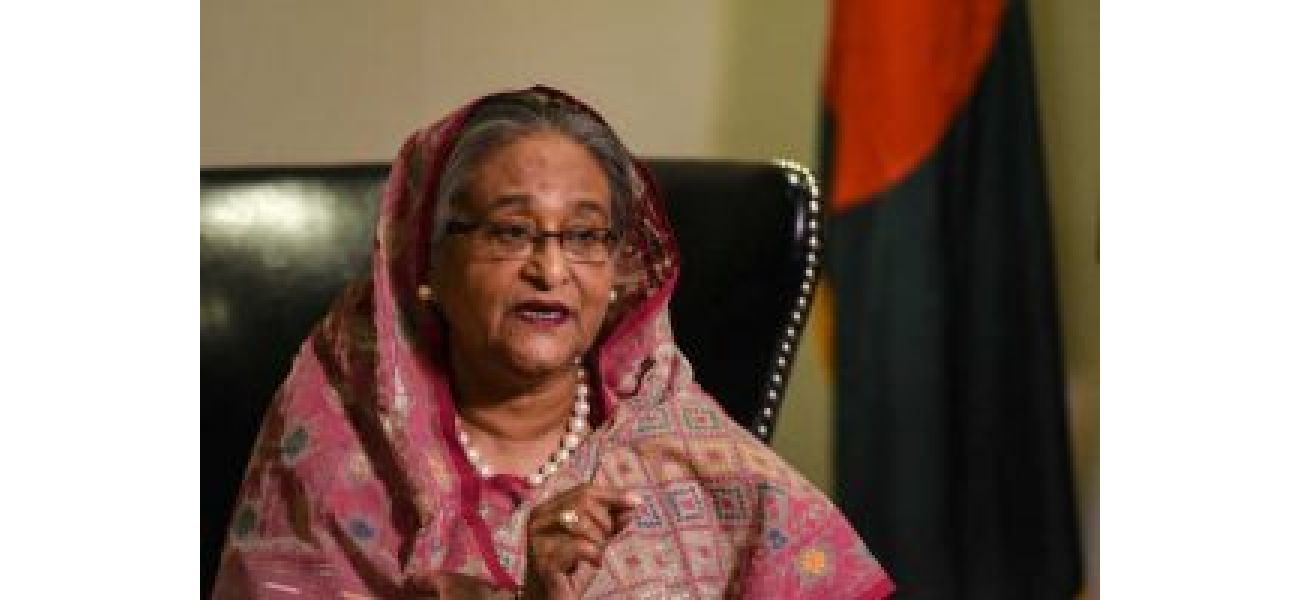Death penalty is a highly controversial issue in Bangladesh, with Prime Minister Hasina supporting it while human rights groups condemn it.
Bangladesh tribunal sentences former PM Sheikh Hasina to death for crimes against humanity, including murder and ordering use of lethal weapons against protesters during student uprising.
November 18th 2025.

In a recent development, a tribunal in Bangladesh has issued a death sentence for former Prime Minister Sheikh Hasina on November 17. This decision came after she was found guilty of committing crimes against humanity, including murder and ordering the use of lethal weapons against protesters during a student uprising that resulted in her ousting last year. The trial was conducted in absentia as Hasina had fled into exile, making it evident that she would face the harshest punishment.
The verdict did not come as a surprise to many, as it was clear that Hasina would be held accountable for the deaths of hundreds of civilians during the initially peaceful protests that turned violent due to the ruthless actions of the security forces. The whole world witnessed the brutality of this crackdown through social media, with students even resorting to extreme measures such as jumping to their deaths or sustaining severe injuries when the police raided their university campus. However, Hasina maintained her innocence and criticized the court proceedings against her. Along with her, the ex-interior minister Asaduzzaman Khan Kamal and former police chief Chowdhury Abdullah Al-Mamun were also convicted, but only the latter was present in court during the sentencing. He had pleaded guilty in July and testified as a state witness. This verdict aligns with the promises made by the interim government of Muhammad Yunus, who was tasked with leading the country out of the brief period of bloodshed and chaos and into a stable electoral democracy with free and fair elections.
Throughout the trial, prosecutors presented evidence of Hasina's direct involvement in the use of lethal force to suppress the student-led uprising. However, trials in absentia are often controversial, and doubts are raised about the fairness of the proceedings. There is no guarantee that the verdict was reached with due diligence, and Hasina has already stated her willingness to face a trial conducted under an elected government. While she could not defend herself in this case, the prosecution claims that she did not take advantage of the opportunity to present her side of the story. On the other hand, a spokesperson for the interim government of Yunus denies any political motive behind the trial and asserts that it was transparent, with observers allowed and regular documentation published. Despite any suspicions surrounding the trial, it is evident that the crisis in Bangladesh will only deepen with the upcoming elections in February 2026.
The opposition party, Awami League, has already indicated that they will most likely boycott the elections as they do not have faith in a fair outcome under the caretaker government. India, being in a tricky situation, is unlikely to extradite Hasina to face the sentence, as she is known to be the most pro-Indian politician in Bangladesh. However, the Yunus government is determined to bring her back to the country. The people of Bangladesh, who have been affected by Hasina's rule, were overjoyed by the verdict and will not accept India's refusal to withdraw the asylum given to her. This could potentially lead to anti-India protests, which the interim government will have to handle carefully, considering the country's dependence on foreign trade and investment for economic growth.
To give credit where it's due, Yunus has managed to improve the country's economy to some extent. However, for foreign investment to flow in, peace and stability are crucial, which seems like a distant dream for Bangladesh at the moment. With the death sentence awarded to Hasina, the situation appears even bleaker. The country's case should serve as a lesson for democratically elected leaders who have dictatorial ambitions.
Despite winning multiple elections through the ballot, doubts have been cast on the legitimacy of Hasina's last election results, with allegations of manipulation. While these claims cannot be proven, they create a sense of doubt and mistrust among the people, similar to the allegations of corruption at the highest level. When these seeds of doubt are planted, they grow into a forest of unrest among the citizens, which can erupt into violence at any given opportunity.
Hasina resorted to using the police and paramilitary to suppress her own people. When unarmed citizens rose up to protest against her, the armed forces were seen fleeing on social media. The best way to govern a nation democratically is by keeping one's ears to the ground and having a genuine concern for the well-being of the people. Otherwise, the leader and their closest associates will always manage to escape or, if caught, face the gallows.
The verdict did not come as a surprise to many, as it was clear that Hasina would be held accountable for the deaths of hundreds of civilians during the initially peaceful protests that turned violent due to the ruthless actions of the security forces. The whole world witnessed the brutality of this crackdown through social media, with students even resorting to extreme measures such as jumping to their deaths or sustaining severe injuries when the police raided their university campus. However, Hasina maintained her innocence and criticized the court proceedings against her. Along with her, the ex-interior minister Asaduzzaman Khan Kamal and former police chief Chowdhury Abdullah Al-Mamun were also convicted, but only the latter was present in court during the sentencing. He had pleaded guilty in July and testified as a state witness. This verdict aligns with the promises made by the interim government of Muhammad Yunus, who was tasked with leading the country out of the brief period of bloodshed and chaos and into a stable electoral democracy with free and fair elections.
Throughout the trial, prosecutors presented evidence of Hasina's direct involvement in the use of lethal force to suppress the student-led uprising. However, trials in absentia are often controversial, and doubts are raised about the fairness of the proceedings. There is no guarantee that the verdict was reached with due diligence, and Hasina has already stated her willingness to face a trial conducted under an elected government. While she could not defend herself in this case, the prosecution claims that she did not take advantage of the opportunity to present her side of the story. On the other hand, a spokesperson for the interim government of Yunus denies any political motive behind the trial and asserts that it was transparent, with observers allowed and regular documentation published. Despite any suspicions surrounding the trial, it is evident that the crisis in Bangladesh will only deepen with the upcoming elections in February 2026.
The opposition party, Awami League, has already indicated that they will most likely boycott the elections as they do not have faith in a fair outcome under the caretaker government. India, being in a tricky situation, is unlikely to extradite Hasina to face the sentence, as she is known to be the most pro-Indian politician in Bangladesh. However, the Yunus government is determined to bring her back to the country. The people of Bangladesh, who have been affected by Hasina's rule, were overjoyed by the verdict and will not accept India's refusal to withdraw the asylum given to her. This could potentially lead to anti-India protests, which the interim government will have to handle carefully, considering the country's dependence on foreign trade and investment for economic growth.
To give credit where it's due, Yunus has managed to improve the country's economy to some extent. However, for foreign investment to flow in, peace and stability are crucial, which seems like a distant dream for Bangladesh at the moment. With the death sentence awarded to Hasina, the situation appears even bleaker. The country's case should serve as a lesson for democratically elected leaders who have dictatorial ambitions.
Despite winning multiple elections through the ballot, doubts have been cast on the legitimacy of Hasina's last election results, with allegations of manipulation. While these claims cannot be proven, they create a sense of doubt and mistrust among the people, similar to the allegations of corruption at the highest level. When these seeds of doubt are planted, they grow into a forest of unrest among the citizens, which can erupt into violence at any given opportunity.
Hasina resorted to using the police and paramilitary to suppress her own people. When unarmed citizens rose up to protest against her, the armed forces were seen fleeing on social media. The best way to govern a nation democratically is by keeping one's ears to the ground and having a genuine concern for the well-being of the people. Otherwise, the leader and their closest associates will always manage to escape or, if caught, face the gallows.
[This article has been trending online recently and has been generated with AI. Your feed is customized.]
[Generative AI is experimental.]
0
0
Submit Comment





